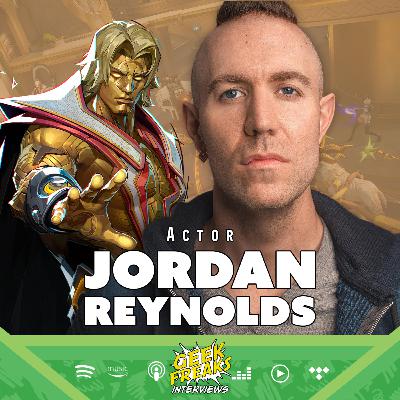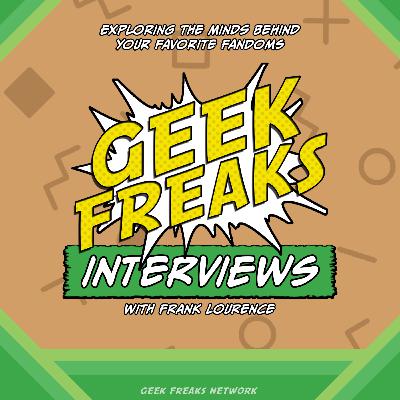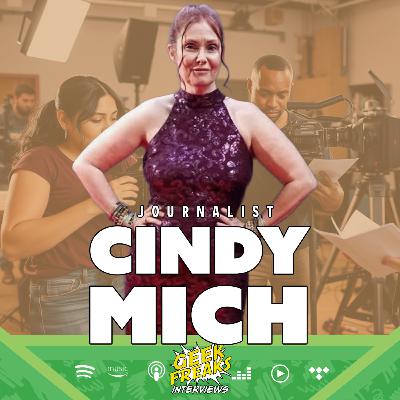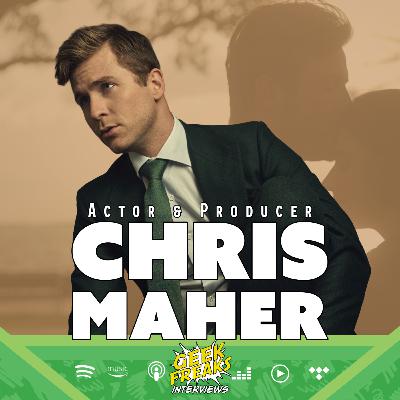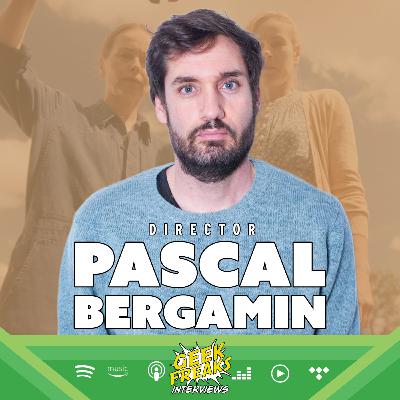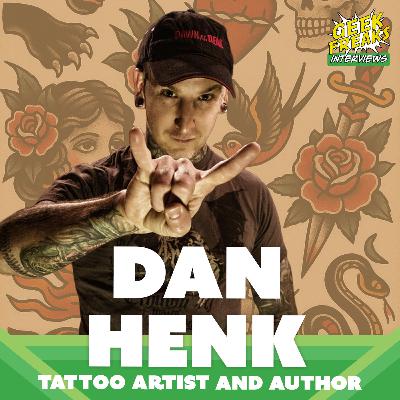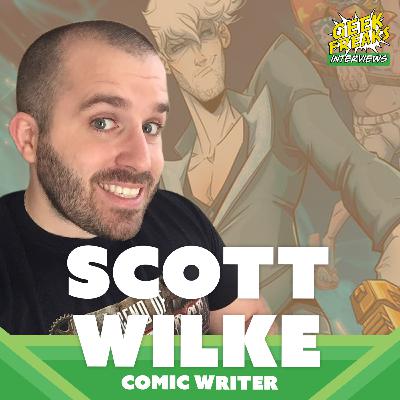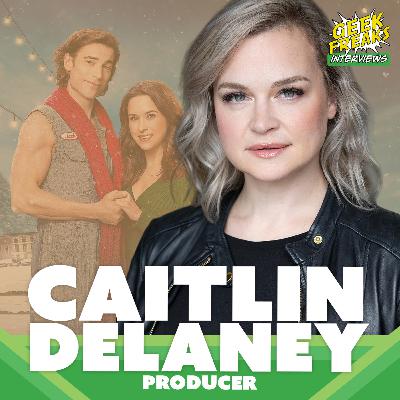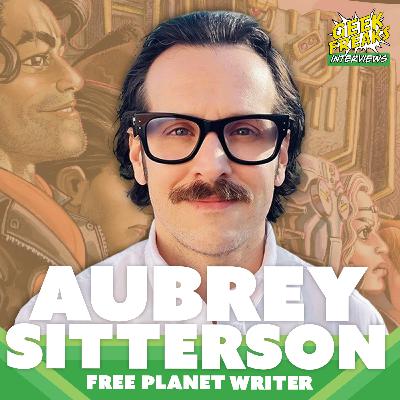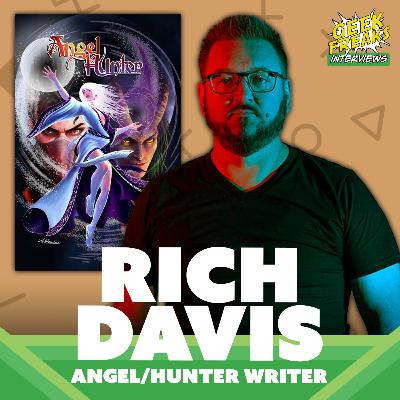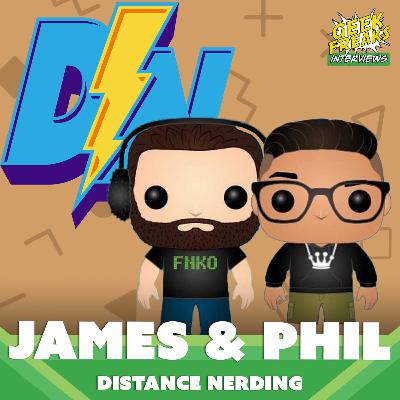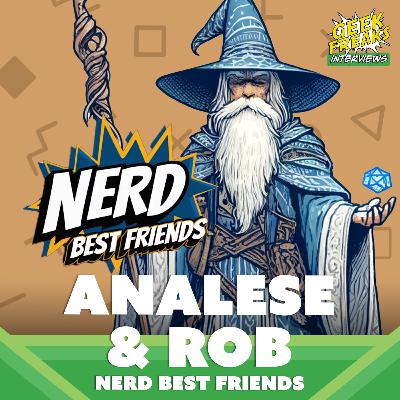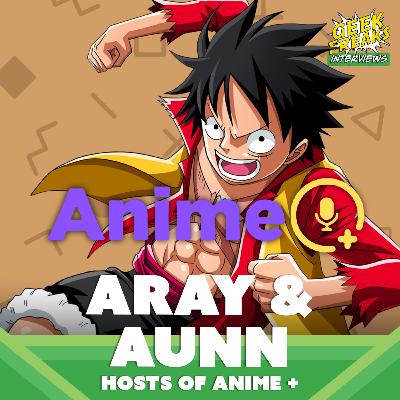Discover Geek Freaks Interviews
Geek Freaks Interviews

112 Episodes
Reverse
Voice actor Jordan Reynolds joins Geek Freaks to unpack his role as Adam Warlock in Marvel Rivals, how he built the character’s calm, reliable presence, and what it takes to deliver clean, useful callouts that help players in the moment. He talks audition mindset, working with voice director Michael Sirieix at Brightskull Studios, and shaping performance to match gameplay. We also get fun stories from his early days on the Warner Bros. lot, meeting Crispin Freeman, and his World of Warcraft gigs, from Highmountain Tauren to the mead-obsessed Dr. Brandt.00:00 Welcome and setup. Adam Warlock in Marvel Rivals is top of mind.01:13 The audition grind and why booking one feels great.02:18 Avoiding “vanilla” reads and the “submit it and forget it” mindset.04:35 Building Adam’s voice as a hopeful, stable anchor within game limits.05:24 Banter vs barks and keeping warmth in slower lines.08:26 Playing a methodical healer and letting that inform delivery.09:34 Working with voice director Michael Sirieix at Brightskull Studios.12:05 Making “Born Again” crystal clear for teammates while keeping emotion.17:43 World of Warcraft roles, from Highmountain Tauren to Dr. Brandt in The War Within.19:40 Pitch shifting, finding old lines, and fans spotting his work.23:56 First in studio gig at Warner Bros., “Countdown to Geostorm,” and meeting Crispin Freeman.Adam Warlock’s voice sits in a steady, reliable pocket that uplifts the team even when the action spikes.Functional clarity matters. Short barks like “Born Again” must be instantly readable and still feel human.Great sessions balance instincts with direction from the studio to align reads with gameplay needs.Auditions should reflect what resonates with you. Chasing every note leads to safe reads that blend in.“Submit it and forget it” helps you stay sane when audition volume is high.Early studio moments matter. That first WB lot gig and meeting heroes like Crispin Freeman fueled the journey.In WoW, he has credits from Highmountain Tauren to Dr. Brandt’s mead mission in The War Within.“He is hopeful, he is uplifting, and he’s an anchor.”“Everything is very clinical, methodical.”“Submit it and forget it.”“Countdown to Geostorm in five, four, three, two, one.”If you enjoyed this episode, follow the show, leave a rating and review, and share it with a friend. Tag us with #GeekFreaksPodcast so we can highlight your post.Show hub and news source: GeekFreaksPodcast.comAll news discussed on our podcast is sourced from GeekFreaksPodcast.com.Facebook: https://www.facebook.com/thegeekfreakspodcastThreads: https://www.threads.net/@geekfreakspodcastPatreon: https://www.patreon.com/GeekFreakspodcastTwitter: https://twitter.com/geekfreakspodInstagram: https://www.instagram.com/geekfreakspodcast/Got a question for Jordan or a topic you want us to cover next time? Send it our way, and we’ll feature your question in a future episode.Apple Podcast tags: Geek Freaks, Jordan Reynolds, Marvel Rivals, Adam Warlock, Voice Acting, World of Warcraft, Brightskull Studios, Michael Sirieix, Crispin Freeman, InterviewTimestamps and TopicsKey TakeawaysQuotesCall to ActionLinks and ResourcesFollow UsListener Questions
Frank sits down with developer and former podcaster Alex Austin to talk about BitCade, a podcast app for iOS and Android that blends listening, creator monetization, and a built in social feed. Alex explains how token based unlocks, short term subscriptions, and low cost in app ad slots help indie shows earn, why BitCade values follow back over follower counts, and how the platform plans to grow with video, live features, and community moderation. Frank also announces a giveaway for 28 Years Later codes on BitCade and Alex pledges to sponsor an extra prize. They wrap with trends across TikTok, YouTube, and video podcasting, plus Alex’s side quest running a trading card shop.00:00 Introduction and guest welcome00:18 Alex returns to the mic00:34 What BitCade is and how Apple Podcast search powers discovery00:52 Monetization with token bundles and bonus galleries01:52 Three and six month gallery unlocks02:22 Why add a social feed and how it differs from typical platforms03:10 Keeping networks small and easy to filter03:53 Rewarding mutual follows instead of chasing follower counts04:07 Bot fatigue and why engagement beats vanity numbers05:00 TikTok vs Twitter and centering creators in the feed05:32 How podcasters can use the social feed daily05:52 Indie ad slots, token costs, and seven day placements06:59 Extra promo in the feed and merch link options07:28 Frank’s results after buying a trending slot08:03 Giveaway on BitCade for 28 Years Later digital codes08:36 Alex adds a sponsored prize under fifty dollars09:14 What is next for BitCade and scaling with creators09:57 Live streams as a likely premium feature10:11 Building an in house RSS API as usage grows10:46 Plan to donate most net profits to rotating charities after recouping costs11:12 Community voting on monthly charities and regional focus13:00 Moderation approach and future network admin roles14:58 Keeping the community welcoming and inclusive16:00 Algorithm whiplash and follower fatigue16:45 Video uploads, bandwidth realities, and premium bitrates18:39 YouTube’s share of podcast consumption and what it means19:33 Why audio still rules for listeners who multitask20:26 Trend planning and real world data use21:28 Alex’s trading card shop and pack pulling stories23:33 The shop with the giant wizard and a dream location25:43 Geek culture catch up and casting chatter28:04 How to reach Alex inside the app and episode closeAlex will sponsor an additional prize under fifty dollars to boost the giveaway.Roadmap items include live streaming as a premium feature and a homegrown RSS API to handle scale.After recouping development costs, Alex plans to donate most net profits to charities chosen by the community, potentially by region.Moderation focuses on safety, verified podcaster admin tools, and daily checks to keep the feed clean and welcoming.Video podcasting demand is growing, but audio remains the primary way most people listen while doing other tasks.“It should be about the content and about the podcaster.”“We reward follow back, not follower counts.”“If you are serious about podcasting, grab an indie ad slot and make it work for you.”“Once I make my principal back, I want to give the net profits to charity.”“Audio is still king for listeners who multitask.”GeekFreaksPodcast.com for news mentioned on our shows and network updatesFind BitCade in the iOS App Store and on Google PlayNeed help claiming your show on BitCadeMessage Alex Austin inside the appFacebook: https://www.facebook.com/thegeekfreakspodcastThreads: https://www.threads.net/@geekfreakspodcastTwitter: https://twitter.com/geekfreakspodInstagram: https://www.instagram.com/geekfreakspodcast/Patreon: https://www.patreon.com/GeekFreakspodcastWhat creator tools or features would help you most on a podcast app
In this episode of Geek Freaks, we continue our conversation with the crew from Distance Nerding. Liam, Jen, and Matt (aka Graveyard) join us to share how their live show has evolved since its start in 2020, the importance of networking in the podcasting world, and how community engagement fuels their growth. From their origins in online fandoms to running a safe space for geeks to hang out, the team opens up about the challenges and benefits of going live, their favorite fandoms, and their ambitious future plans. We also wrap things up with some fun “Geek Box” questions, revealing the fictional worlds they’d live in, the franchises they’d reboot, and their ultimate comfort shows.00:00 Introductions to the Distance Nerding crew01:00 Lessons learned from years of podcasting02:00 Networking and building a geek community04:00 How the hosts joined the show and their unique backgrounds06:00 What makes Distance Nerding’s community different07:00 Balancing niche passions like horror and sci-fi09:00 The benefits of going live and engaging with chat11:00 Conventions and in-person fan interactions12:00 Live streaming vs. pre-recorded content14:00 Handling live show challenges and improv moments16:00 In-person vs. online podcasting dynamics18:00 Post-pandemic podcast advantages19:30 Future goals for Distance Nerding23:40 “Geek Box” question – Fictional universes they’d live in28:40 “Geek Box” question – Franchises they’d reboot or continue33:38 “Geek Box” question – Comfort TV shows and movies39:10 Closing thoughts and where to find Distance NerdingNetworking is essential to building and sustaining a podcast community.Live streaming encourages organic bits, ongoing jokes, and strong audience connections.The team blends niche fandoms, from horror to sci-fi, creating a well-rounded geek space.In-person convention appearances help expand their reach beyond the live chat.Post-pandemic podcasting has opened doors for remote hosting without losing audience engagement.Creative future plans include live play RPG content with immersive sound design.“Networking is so vital, especially when you’re trying to build community. That’s a big part of podcasting nowadays.” – Liam“We’re a lot more casual… it’s how you talk to your geek friends about random matchups.” – Matt (Graveyard)“Live is better for off-the-cuff moments. That’s when we’re at our most ourselves.” – Jen“I want the terror back in Nightmare on Elm Street. Bring back the fear.” – Matt (Graveyard)“Ted Lasso is my go-to feel-good show when I’m feeling down.” – LiamIf you enjoyed this conversation, subscribe to Geek Freaks on your favorite podcast app, leave a review to help others discover the show, and share this episode with your fellow geeks. Use #GeekFreaksPodcast when posting about the episode so we can join in on the conversation.Visit GeekFreaksPodcast.com for all the latest geek news and full episode archives.Facebook: facebook.com/thegeekfreakspodcastThreads: threads.net/@geekfreakspodcastPatreon: patreon.com/GeekFreakspodcastInstagram: instagram.com/geekfreakspodcastTwitter: twitter.com/geekfreakspodWhat fictional universe would you want to live in for a year? Send your answer to us through social media or our website for a chance to be featured in a future episode.Apple Podcast Tags:Distance Nerding, geek culture podcast, live podcasting, podcast community building, networking for podcasters, horror fandom, sci-fi fandom, comic book fandom, convention culture, post-pandemic podcasting, live streaming tips, geek interviews, podcast improv, comfort TV shows, fictional universesTimestamps and Topics:Key Takeaways:Quotes:Call to Action:Links and Resources:Follow Us:Listener Questions:
In this powerful episode of Geek Freaks, we sit down with Cindy Mich—award-winning journalist, indie filmmaker, author, and founder of the Art Is Alive Film Festival. Cindy opens up about her roots in writing, the transition into broadcasting, and how she's building platforms to elevate unheard voices. From launching her own magazine, Elegant Expressions, to writing a screenplay for Holocaust survivor Ben Lesser, Cindy shares how personal loss, deep compassion, and sheer determination have shaped her career.This conversation is packed with insights on independent media, the realities of the film festival world, and how storytelling can create real change.Timestamps and Topics:00:00 Welcome and intro to Cindy Mich00:54 Cindy’s origin story and early influences02:13 Breaking into journalism without a degree03:10 Staying authentic in the age of social media04:18 Jumping into broadcasting via Blogtalk Radio05:50 Looking back on 450+ interviews06:53 Radio vs. podcasting in the modern era08:13 Why writing is still Cindy’s first love09:03 Choosing the right medium for a story10:24 The mission behind Elegant Expressions magazine11:56 Giving voice to indie filmmakers, small businesses, and survivors13:13 How journalism shaped Cindy’s approach to filmmaking15:09 Bridging the gap between media and film17:35 The growth of Art Is Alive Film Festival19:02 Hybrid distribution model and outreach21:29 Long-term community building through festivals23:18 Debunking film festival misconceptions25:22 Creating lasting connections through collaboration27:01 The evolution of Cin’s Chat Corner29:07 Cindy’s work with Holocaust survivor Ben Lesser31:01 Writing Ben’s screenplay and preserving legacy33:06 Balancing projects after personal loss35:28 Healing through storytelling37:43 Cindy’s personal legacy and final adviceKey Takeaways:Cindy built a successful media career through authenticity, persistence, and a commitment to elevating others.Art Is Alive isn’t just a festival, it’s a launchpad for indie creators looking to break through the noise.Independent filmmakers often don’t understand the business side—Cindy is actively helping them learn.She’s currently writing a screenplay about Holocaust survivor Ben Lesser, guided by trust and respect for his voice.Personal grief led her to deepen her mission to lift up others who feel invisible.Memorable Quotes:🗣️ “Words are magic. They can make people feel, inspire, and move forward.”🗣️ “If you’re not seen, you’re forgotten. My job is to make sure that doesn’t happen.”🗣️ “Never do anything for money. Do it because it matters.”Call to Action:Enjoyed this conversation with Cindy Mich: https://cindy-mich-award-winning-journalist.yolasite.com/Subscribe, leave a review, and share the episode using #GeekFreaksPodcast. Visit GeekFreaksPodcast.com for the latest geek culture news.Follow us on social:📱 Instagram: @geekfreakspodcast📘 Facebook: Geek Freaks Podcast🧵 Threads: @geekfreakspodcast🐦 Twitter: @geekfreakspod💸 Support us on Patreon: Geek Freaks PatreonHave a question or want to be featured on a future episode? Email us at info@gfpods.com or DM us on any of our socials.Apple Podcast Tags:Cindy Mich, Art is Alive Film Festival, indie film, journalism, Elegant Expressions, podcast interview, Holocaust survivor, Ben Lesser, public access TV, indie filmmakers, Geek Freaks, inspirational stories, filmmaking journey, media careers, podcast guest, creative storytelling, geek culture
This week on Geek Freaks Interviews, actor and producer Chris Maher joins Frank to talk about balancing passion and practicality in the film world. From his early days in Omaha theater to earning an economics scholarship in China, Chris shares how his unlikely journey shaped the way he builds a career in indie film. They dive into Nova, his upcoming sci-fi romance that’s grown from a short to a full feature, and talk about his business-minded approach to acting, producing, and investing in his own work. Chris also gets candid about rejection, screen tests, self-funded stunts, and why a headshot and a good class can change your career.Timestamps:00:00 – Welcome and intro00:40 – Chris’s acting roots in Omaha01:48 – Almost became a veterinarian02:25 – Why he left the arts to study business05:00 – How modeling brought him back to acting06:31 – What Nova is and how it evolved into a feature09:00 – Producing the feature and finding cast10:25 – Differences between shorts and features12:26 – Editing, logistics, and post-production15:05 – Using his background in economics and crypto to fund films17:06 – Favorite genres: comedy, action, and the struggle of being “big” on camera20:01 – Doing his own stunts (yes, even jumping out of a car)21:38 – Constantly auditioning, staying positive23:00 – When a role is written just for you24:11 – What it’s like being flown in for a screen test27:10 – Best advice for new actors (hint: headshots and classes)30:58 – Upcoming projects: Boardwalk Winter, Vindicator, Hack JobKey Takeaways:Nova is a passion project being developed into a feature after sweeping festivals.Chris’s economics degree helps him invest smartly in indie films.He emphasizes that auditioning is the real job, and consistency is key.His favorite genre to perform is comedy, but he has major respect for dramatic subtlety on camera.Acting classes aren’t just educational—they’re networking gold.Doing your own stunts might be easier if you grew up without a smartphone.Quotes to Pull:“Auditioning is the real job. Filming is the reward.”“Shorts are practice. Features are war.”“This business is about longevity. Talent matters, but business acumen keeps you in the game.”“They wrote the role for me. That’s the dream.”Call to Action:Enjoy the conversation? Subscribe, rate, and review Geek Freaks Interviews wherever you get your podcasts. Tag us with your favorite moment using #GeekFreaksInterviews and check out Chris’s projects like Nova and Boardwalk Winter.🎙️ Visit GeekFreaksPodcast.com for all our latest news and episodes.Follow Us Online:Facebook: facebook.com/thegeekfreakspodcastInstagram: instagram.com/geekfreakspodcastTwitter: twitter.com/geekfreakspodThreads: threads.net/@geekfreakspodcastPatreon: patreon.com/GeekFreakspodcastSend in Your Questions:Want us to ask your question on the next interview? Message us on socials or through the contact form at GeekFreaksPodcast.com.Apple Podcast Tags:Chris Maher, Nova Movie, Indie Actor Interview, Sci-Fi Film, Acting Advice, Boardwalk Winter, Vindicator Film, Geek Freaks Interviews, Indie Film Hustle, Acting Career Tips
In this Geek Freaks Interviews episode, Frank sits down with filmmaker Pascal Bergamin, the creative force behind Portraits of Dangerous Women. Inspired by a collection of quirky vintage photographs, Pascal shares how the idea evolved into a film about grief, connection, and the quiet power of flawed characters.They dig into the meaning behind the word “dangerous,” what it takes to keep authenticity alive on set, and how indie filmmakers survive the chaos of production and distribution. It’s a deep look at what it means to tell human stories with limited resources but unlimited passion.Timestamps:00:00 Intro and warm-up06:24 Meet Pascal Bergamin07:00 The inspiration behind Portraits of Dangerous Women08:19 A photo book that changed everything10:13 Humor as the bridge between grief and absurdity12:54 Redefining “dangerous”14:23 Letting characters be flawed and real17:10 Casting without auditions and trusting instincts23:00 The unforgettable dog scene25:17 Creating a world that feels familiar but offbeat29:45 How the U.S. release differs from the UK31:02 What indie filmmaking still teaches Pascal36:51 What’s next (and why he’s not rushing it)Key Takeaways:Pascal was inspired by real vintage photographs of women doing unusual things—not crime, but acts of boldness and humor.The word “dangerous” in the title reflects unpredictability and spontaneity, not violence or threat.His indie film set prioritized time and space for actors, leading to honest performances.The cast came together without formal auditions, chosen for chemistry and instinct.Distributing an indie film requires just as much hustle as making it.Memorable Quotes:“You don’t have enough time to be nervous.”“They’re not trying to be heroes. They’re reacting to life as it comes.”“Dangerous doesn’t mean violent. It means unexpected.”“Sometimes you just knock on a door with your script in hand and hope for kindness.”Call to Action:If you love indie films, bold characters, or the behind-the-scenes grind of filmmaking, don’t miss this conversation. Portraits of Dangerous Women is now available in the U.S. and Canada. Watch the film, then come back and let us know what you think.Subscribe to Geek Freaks Interviews, leave a rating, and share the episode using #GeekFreaksInterviews.Links and Resources:All stories and updates mentioned in this episode can be found at GeekFreaksPodcast.comFollow Us:Instagram: @geekfreakspodcastThreads: @geekfreakspodcastTwitter: @geekfreakspodFacebook: Geek Freaks PodcastPatreon: Support UsListener Questions:Have a question for a future guest? Want to suggest someone for the next interview? Message us on socials or through our site. Your voice could be in the next episode.Apple Podcast Tags:Pascal Bergamin, portraits of dangerous women, indie filmmaking, director interview, filmmaking podcast, women in film, behind the scenes, Geek Freaks Interviews, creative process, movie interview
In this episode of Geek Freaks Interviews, Frank sits down with the multifaceted Dan Henk—an artist, dark fiction writer, and tattoo veteran—to explore a career built on punk rock attitude, bold art, and haunting stories. Dan walks us through his journey from satirical magazine art to becoming a staple in the tattoo and indie horror scenes. He discusses how personal tragedy and health battles shaped his storytelling and gives us a preview of his upcoming anthology The Joke is on Mankind. Along the way, he shares what it takes to blend visual art and fiction, how community plays a role in independent publishing, and what his future book plans involve—including alien invasions and guerrilla warfare inspired by his military father.Timestamps and Topics:00:00 Introduction to Dan Henk00:36 Dan’s daily creative routine01:13 Early work in punk magazines and political cartoons02:54 Transition to book covers and comics04:04 Tattoo career and NYC hustle05:08 Surviving personal loss and illness05:32 Shift toward dark fiction and The Black Seas of Infinity07:28 Artistic influences and the power of story08:53 How art inspires writing (and vice versa)10:01 How personal trauma shaped Dan’s writing urgency11:13 Preview of new anthology The Joke is on Mankind13:18 On curating diverse voices in indie horror14:38 Dan’s podcast and building a creative network15:43 Newsletter and staying connected with fans16:39 Future writing plans: Alien invasions and father-son dynamicsKey Takeaways:Dan Henk is an artist who channels his life experiences—punk roots, personal loss, and visual storytelling—into dark, compelling fiction.His creative process intertwines art and writing, often one inspiring the other.His new anthology The Joke is on Mankind draws influence from The Outer Limits and Lovecraftian horror with a focus on story over shock.Dan curates a balanced mix of indie and mainstream voices, creating space for underrepresented yet talented creators.He emphasizes authenticity over trend, aiming for lasting impact with each project.Future projects explore themes of societal collapse and alien invasions, merging real-world military insight with speculative fiction.Quotes:"I don’t care what genre it is—as long as it tells a strong story.""After Monica passed, I realized—I need to get these stories out now.""Art inspires my writing and writing brings new life to my art. They feed each other constantly.""You can talk about an idea forever, but at some point, you just have to make it real."Call to Action:If you enjoyed this conversation with Dan Henk, don’t forget to subscribe to Geek Freaks Interviews on your favorite podcast app. Leave us a review and share this episode with your fellow horror fans and creatives using the hashtag #GeekFreaksInterviews. For all updates and episode archives, head to GeekFreaksPodcast.com.Links and Resources:Dan Henk’s website and newsletter: danhenk.comPreorder The Joke is on Mankind (releasing late June)Podcast news source: GeekFreaksPodcast.comFollow Us:Instagram: @geekfreakspodcastTwitter: @geekfreakspodThreads: @geekfreakspodcastFacebook: Geek Freaks PodcastPatreon: Geek Freaks PatreonListener Questions:Have a question for our next guest or want to suggest someone to be interviewed? Message us on social or visit our site to drop us a line!Apple Podcast Tags:Dan Henk, tattoo artist, horror fiction, indie publishing, punk art, dark fiction, cosmic horror, art and writing, creative process, Geek Freaks Interviews
In this episode of Geek Freaks, Frank sits down once again with comic writer Scott Wilke to talk about his latest installment in the Periwinkle Saga—Frost. Scott reveals the dark holiday-themed universe he's building with gritty one-shots like Cupid and Frost, blending inspiration from John Wick, Pulp Fiction, and classic holiday lore. He also shares what’s coming next in the saga (O’Hare), explores the storytelling challenges of single-issue comics, and teases other upcoming Bad Bug projects including Junk World, Murder Mary, and Xeno Geist. This one’s a must-listen for indie comic fans and anyone who loves morally complex heroes.Timestamps and Topics:00:00 Introduction and Scott’s return00:29 The origin and tone of Frost01:34 John Wick vibes and Arturo Meza’s vital role02:16 Expansion plans for the Periwinkle universe03:35 The mob power vacuum behind the Periwinkle stories04:07 Why holiday mythology makes a great sandbox05:13 Morally gray characters and relatability06:52 The human side of Jack Frost and father-son dynamics08:09 How Scott collaborates with artist Arturo09:43 Trusting the artist to elevate the vision12:09 Writing method and storyboarding for comics13:35 Film influences in structure and tone15:28 Why Periwinkle is still a must-read16:07 Preview of upcoming titles: Junk World, Murder Mary, Xeno Geist20:07 New artistic collaborations and creative challenges22:04 Where to follow Scott online23:10 Kickstarter's evolving role in indie comics25:10 Passion over profit and creative freedom25:47 If Scott could write for the Big Two: Superman or Punisher?27:34 Final thoughts and where to start in the Periwinkle SagaKey Takeaways:Frost is a gritty, John Wick-style one-shot starring Jack Frost as a hitman in a mythological mob war.The Periwinkle Saga is building toward crossover stories, but each one-shot can be enjoyed on its own.Artist Arturo Meza plays a huge role in maintaining the cohesive tone and world-building.Scott uses film structure and storyboard planning to craft compact, character-driven narratives.New titles like Junk World and Murder Mary reflect Scott’s range—from space smuggling to fourth-wall-breaking mayhem.Kickstarter provides unmatched creative freedom and direct reader engagement for indie creators.Despite writing morally gray stories, Scott's dream characters to write include Superman and Punisher.Quotes:🗯️ "Frost is my love letter to John Wick... He’s not just a killer—he’s trying to break free of his father’s shadow."🗯️ "Each one-shot tells its own story, but for those following closely, the saga is building toward something much bigger."🗯️ "Arturo learned English through Tarantino movies—so our comics were always going to be wild."🗯️ "Kickstarter is where indie comics thrive. It’s not about profit—it’s about passion and storytelling."Call to Action:Love comics with a gritty twist and deep mythology? Subscribe to Geek Freaks and don’t forget to leave a review on Apple Podcasts. Share this episode with fellow comic lovers using #GeekFreaksPodcast and let us know which Periwinkle character you want to see return!Links and Resources:🔗 GeekFreaksPodcast.com — Source of all our news and updates📖 Follow Scott on Instagram: @scottwilke24🎯 Back his comics on Kickstarter and find his work via Bad Bug MediaFollow Us:📲 Facebook: facebook.com/thegeekfreakspodcast📲 Threads: @geekfreakspodcast📲 Instagram: @geekfreakspodcast📲 Twitter: @geekfreakspod📲 Patreon: patreon.com/GeekFreakspodcastListener Questions:Have a question for Scott or want us to explore a specific indie comic on the next episode? DM us or email through GeekFreaksPodcast.com!Apple Podcast Tags:Scott Wilke, Periwinkle Saga, Frost Comic, Indie Comics, Bad Bug Media, Kickstarter Comics, Comic Book Writer, Comic Book Interview, John Wick Inspired Comics, Holiday Comic Universe, Geek Culture
In this episode of Geek Freaks Interviews, Frank is joined by Mark Domeier, a passionate middle school English teacher from Minnesota who uses comic books and pop culture to bring reading and writing to life for his students. With a collection of over 14,000 comics, Mark shares how he leverages his love for superheroes and stories like Star Wars, The Outsiders, and even The Mandalorian to make literature relevant and fun. We explore how comic books support reading comprehension, creativity, and engagement, and how fandom can help students find their voice in writing. Whether you're an educator, comic lover, or lifelong geek, this episode is full of inspiration.Timestamps and Topics:00:00 – Intro and welcome00:22 – Mark’s comic collection and using comics in education01:08 – Visual storytelling and reading comprehension02:53 – Mark’s first comic subscription and lifelong love of Spider-Man04:22 – From Marvel to DC: Expanding fandom05:59 – What inspired Mark to become a teacher07:07 – Encouraging reading through comics and creative assignments08:01 – Teaching with Star Wars in the classroom09:57 – Using essays to analyze Star Wars and develop critical thinking11:29 – Comics in lessons: Drawing stories, analyzing narratives13:17 – Creative final projects: Comic books, screenplays, and songs16:08 – Fighting for creativity in the age of AI18:23 – Middle school creativity vs. deeper literary structures21:08 – MCU, Mandalorian, and how current media inspires students23:37 – From the classroom to pop culture essays and fandom discussion25:01 – Connecting WWII and Star Wars in teaching Anne Frank26:32 – Fandoms showing students what makes a good person29:07 – Using sports fandom in class to build engagement30:55 – Funko Pops, Stephen King, and knowing your students33:02 – Meeting students where they are and guiding them forward35:40 – Advice for teachers using fandom in education38:29 – Closing thoughts and gratitudeKey Takeaways:Comics can help students visualize and understand stories, boosting comprehension and engagement.Students are more likely to connect with material when they see their interests and strengths reflected in it.Pop culture like Star Wars and the MCU can be tools for teaching analysis, persuasive writing, and historical parallels.Offering students options in how they express learning—whether through art, comics, or music—promotes creativity.Teachers must adapt to their students’ learning styles and passions, especially in a world increasingly impacted by AI.Fandom isn’t just entertainment—it’s a pathway to deeper learning and connection.Memorable Quotes:“If you read 20 or 25 comic books, that’s the same as reading a novel.”“Every student should read The Outsiders. I’ve taught it almost every year of my career.”“I’m just going to go out kicking and screaming, fighting to make kids be creative.”“I remember being a kid and wishing that I could be bitten by a radioactive spider.”Call to Action:If you loved this episode, subscribe to Geek Freaks Interviews on your favorite podcast app. Leave us a review, share the episode with your fellow educators and comic fans, and tag us with your thoughts using #GeekFreaksPod!Links and Resources:🌐 GeekFreaksPodcast.com — Source for all our news and episodesFollow Us:📱 Facebook: facebook.com/thegeekfreakspodcast📸 Instagram: @geekfreakspodcast🐦 Twitter: @geekfreakspod💬 Threads: @geekfreakspodcast🎧 Patreon: patreon.com/GeekFreakspodcastListener Questions:Have a question for Mark or thoughts on using comics in the classroom? Send them our way and we might include them in a future episode!Apple Podcast Tags:comics, education, Star Wars, Marvel, teaching strategies, pop culture in school, middle school reading, student creativity, graphic novels in education, Geek Freaks Interviews
In this episode of Geek Freaks Interviews, Frank sits down with acclaimed author Barry Lyga to explore his multifaceted writing career spanning comics, YA thrillers, and prose adaptations of iconic superhero stories. Barry opens up about his journey from comics to novels, his work on the I Hunt Killers trilogy, how he crafted Thanos' backstory for Marvel Studios, and what it was like building an alternate DC Universe through The Flash book series. From creating Free Comic Book Day to writing some of the darkest scenes of his career, Barry brings insight, humor, and a deep love for the medium.Timestamps and Topics:00:00 Intro and Barry Lyga’s career overview00:32 From comics to novels: The origin of Fanboy and Goth Girl02:07 Common theme: Writing from the outsider’s perspective03:37 Writing Wolverine: Worst Day Ever and the young outsider angle04:24 How comics shaped his prose style and genre-blending06:27 Switching genres with I Hunt Killers08:11 Making dark characters likable09:15 Challenges writing from a new POV and writing Superman11:15 Behind the scenes of The Flash tie-in novels14:17 Using obscure DC characters like Ambush Bug18:14 Capturing Barry Allen’s voice and injecting science20:52 Writing Thanos: Titan Consumed for the MCU23:00 The challenge of creating Thanos without key Marvel characters27:17 Matching the tone of Infinity War without seeing it28:43 Thanos’ logic and why doubling resources wouldn't work29:32 The origin of Free Comic Book Day33:11 Modern comic book accessibility and barriers35:53 The limits of digital comics today38:16 The release of Before the Hunt and going indie40:31 Final thoughts and where to find Barry’s booksKey Takeaways:Barry Lyga’s stories consistently center around outsiders, a reflection of his own childhood.His novel Wolverine: Worst Day Ever explores being an outsider among outsiders.Writing Thanos: Titan Consumed required building a full backstory that matched the MCU without relying on comic continuity.The Flash book series was set in an alternate timeline to allow more creative freedom while respecting CW’s canon.Free Comic Book Day began as a brainstorm to unite the comic book industry and increase visibility for local shops.Barry's newest release, Before the Hunt, is a self-published anthology of prequel stories to I Hunt Killers.Memorable Quotes:“I think outsiders typically have a really interesting perspective on what’s going on.”“Creation is harder than destruction—that’s why Thanos didn’t double resources.”“You don’t have to be one kind of writer. It’s all about the story.”“I almost jumped out of my seat when I saw Infinity War. I thought, that’s my Thanos.”“Stop recommending Watchmen to new readers.”Call to Action:Enjoyed this episode? Don’t forget to subscribe, leave a 5-star review, and share the podcast using #GeekFreaksPod. Help us grow the show and bring on more amazing guests like Barry Lyga!Links and Resources:🔗 GeekFreaksPodcast.com – Your source for all the news we discuss📖 BarryLyga.com – See Barry’s full body of work📘 Before the Hunt – Order Barry’s latest release nowFollow Us:Instagram: @geekfreakspodcastTwitter: @geekfreakspodThreads: @geekfreakspodcastFacebook: facebook.com/thegeekfreakspodcastPatreon: patreon.com/GeekFreakspodcastListener Questions:Got a question for our next guest or a topic you want covered? Message us on any platform or email contact@geekfreakspodcast.com.Apple Podcast Tags:Barry Lyga, I Hunt Killers, Thanos Titan Consumed, Wolverine Worst Day Ever, The Flash CW, comic book adaptations, superhero novels, writing tips, Marvel books, DC Universe books, Free Comic Book Day
In this episode of Geek Freaks Interviews, Frank sits down with Richard Sparks, writer of the epic fantasy series New Rock New Roll, New Rock New Realm, and the upcoming New Rock New Rules. Richard, a seasoned screenwriter turned novelist, shares how his background in gaming and storytelling led him to build a world where RPG avatars become real. From crafting immersive friendships to battling ogres with orcs, Richard discusses the challenges of writing layered adventures and how great story structure is the foundation of it all. We also explore his creative process, his Tolkien influence, and the exciting potential for a film or series adaptation.Timestamps and Topics:00:00 Introduction to Richard Sparks and the New Rock series00:18 How gaming inspired the novels00:56 Writing the first book in two months01:40 The main characters and their transformation into avatars02:45 Orcs, magic, and humorous worldbuilding03:28 Expanding the world beyond the original story04:06 Upcoming third book and Halloween launch05:11 How the characters evolve beyond their real-life players06:00 Building fantasy stories using game mechanics and puzzles07:12 Mysteries and reader immersion08:19 Puzzles, prophecies, and foreshadowing in book three09:48 Reader and character discovery unfolding together10:33 Early love for Tolkien and fantasy inspiration12:01 Tolkien’s writing habits and influence on Sparks13:28 The film rights and hopes for adaptation15:26 Lessons from decades of screenwriting17:20 From showing to telling—shifting from script to novel19:32 Layering clues for long-term story payoffs21:04 Letting characters dictate their journey22:24 Scaling stories from epic to personal24:00 Narrative structure and balancing multiple storylines26:16 Lessons from directing and acting workshops30:00 Overcoming rejection and growing as a storyteller33:00 Adventures in publishing, writing, and surviving the industry36:15 Pranks, ogres, and organic character moments39:00 Planning ahead while leaving room for surprises40:30 The illusionist's trick—crafting a worthy ending41:02 Final thoughts and where to get the booksKey Takeaways:New Rock New Roll began as a fantasy inspired by online gaming but evolved into a layered, character-driven series with real emotional depth.Richard emphasizes the importance of story structure, learned from his decades as a screenwriter and director.Humor, mystery, and friendship are core pillars of the New Rock world.Writing ahead, knowing your ending, and embracing rewrites are essential to strong fantasy storytelling.Film and TV adaptations are in early development, with industry interest in building a new fantasy franchise from Sparks’ world.Tolkien’s influence runs deep, and Sparks shares personal connections and insights into the master’s creative legacy.Quotes:“You’ve got to learn how to get out of your own way as a writer.”“The readers deserve to be put on an armchair ride and given a good adventure.”“All the best stories are the same but different.”“The times when you’re not writing are the ones that hurt.”“You’re the illusionist. The whole time, you’ve got them looking one way while you’re building something else.”Links and Resources:📘 Visit GeekFreaksPodcast.com for all the latest episodes, articles, and news📚 Check out Richard Sparks’ books at RichardSparks.com🎉 Learn more about the upcoming launch at the World Fantasy ConventionFollow Us:Facebook: facebook.com/thegeekfreakspodcastInstagram: @geekfreakspodcastThreads: @geekfreakspodcastPatreon: patreon.com/GeekFreakspodcastTwitter: twitter.com/geekfreakspodApple Podcast Tags:fantasy fiction, RPG novels, geek culture, author interview, Tolkien inspiration, writing advice, book series, screenwriting, story structure, podcast interview, fantasy author, creative writing, Geek Freaks
In this episode of Geek Freaks Interviews, Frank sits down with powerhouse Canadian producer Caitlin Delaney. With over 90 films under her belt, Caitlin opens up about her start in Hallmark-style holiday films and her evolution into producing larger thrillers and studio features. She also shares how she’s paying it forward with her new mentorship platform, Up Light Academy, where she’s shaping the next generation of film professionals. This is a must-listen for aspiring filmmakers, indie creators, and anyone curious about how the industry really works behind the scenes.Timestamps and Topics:00:00 – Intro and Caitlin’s current work in film production00:58 – What a service producer does and Caitlin’s early days in Christmas films02:00 – Launching Up Light Academy: training the next generation of filmmakers03:30 – Caitlin’s own path from theater kid to producer04:50 – Challenges breaking into acting and shifting to behind the camera06:05 – Choosing projects, genre shifts, and following market trends07:45 – The pressure of being a production hub and managing multiple teams09:00 – Caitlin’s passion project on human trafficking10:08 – The importance of industry relationships and collaboration11:45 – Streaming’s influence on low-budget, high-return holiday content13:50 – Why story still matters most, not budget15:44 – The rise of character-driven drama in streaming17:10 – Pitching lessons: it’s about worldbuilding and story, not logistics18:11 – Caitlin’s admiration for actor Walton Goggins20:00 – Why mentorship matters more than ever21:20 – Surprising lessons about the business of film23:00 – Teaching respect between producers and creatives24:30 – How Caitlin teaches communication with large crews25:10 – Closing and where to find Caitlin onlineKey Takeaways:Caitlin’s career began in holiday films but now spans thrillers, studio features, and independent theatrical releases.As a service producer, she manages every physical part of a production—from talent deals to post-production.Her Up Light Academy offers free foundational video lessons and live weekly mentorship from industry professionals.Mentorship shortens the learning curve and provides real-world insight that no classroom can replicate.In modern filmmaking, every creator needs to understand producing and marketing.The industry is trending toward character-driven stories, with less emphasis on big-budget spectacle.Success in film still hinges on having a good story and being able to clearly articulate it.Caitlin highlights the value of collaboration, and the evolving role of streamers in creating community-driven content.Quotes:🎙️ “We just take years of onsite experience, crunch it down into 30 videos, and away you go.”🎙️ “You’re not going to make a movie without money. And you’re not going to spend the money without filmmakers.”🎙️ “Mentorship can shave off years of learning. But I’m still being mentored myself—I just spent four hours learning TikTok.”🎙️ “Story is what people care about. Not budget. Not logistics. If you don’t have a good story, you’ve lost them.”Call to Action:Love what you heard? Make sure to subscribe, rate, and review Geek Freaks Interviews wherever you get your podcasts. Share this episode with your fellow film enthusiasts and use #GeekFreaksPod to join the conversation online.Links and Resources:🔗 Visit GeekFreaksPodcast.com — your source for all things geek and film industry news.🔗 Learn more about Caitlin Delaney’s Up Light Academy.Follow Us:📱 Instagram: @geekfreakspodcast📱 Twitter: @geekfreakspod📱 Threads: @geekfreakspodcast📱 Facebook: Geek Freaks Podcast💬 Patreon: Support usListener Questions:Have a question for Caitlin or want to learn more about breaking into the film industry? Message us on social or email us via the website and we’ll feature your question in a future episode.
In this compelling episode of Geek Freaks, Frank sits down with writer Aubrey Sitterson to discuss Free Planet, a new sci-fi epic from Image Comics. Aubrey dives deep into the book’s core themes of freedom, discipline, and revolution, sharing the research and inspiration behind his sprawling geopolitical space opera. From unreliable narrators and anthropological influences to the vital contributions of collaborators like artist Jed Dougherty, letterer Taylor Esposito, and colorist Vittorio Astone, this conversation unpacks how Free Planet became one of the most ambitious and layered comics of the year.Timestamps and Topics:00:00 – Introduction and welcome to Aubrey Sitterson00:19 – What is Free Planet? A saga meets East of West01:03 – The surprising popularity of Talon02:08 – The origins of Free Planet and its political lens04:30 – Revolutionary history and real-world inspirations06:02 – Exploring what freedom really means07:53 – Visual storytelling: spreads, charts, and page design09:46 – Conflict, compromise, and food shortages11:09 – The comic as literature and object12:30 – Sci-fi inspirations: Ursula K. Le Guin, Dune, and more14:17 – Research over aesthetics: grounding the story in truth16:29 – The balance between interpersonal drama and grand politics18:06 – How character dynamics reflect ideological tension20:14 – Page-by-page scripting and Jed’s visual genius22:34 – Weapon design, faction identity, and world-building layers24:49 – Collaborative storytelling and artistic contributions25:54 – Lettering innovations and layered voice design28:01 – Dr. August Ferrucci and the historical narration30:00 – On bias, narration, and the illusion of neutrality31:01 – Bonus material and hand-painted covers34:11 – Liefeld-inspired layouts and homage as design36:15 – The difference between mimicry and foundational homage39:07 – Talon and Basil’s contrasting voices in lettering42:00 – Robert Kirkman’s blurb and industry recognition43:01 – Print versus digital: Why Free Planet demands paperKey Takeaways:Free Planet explores the complexities of freedom, revolution, and post-war society through a sci-fi lens.Aubrey Sitterson researched real-world revolutions, anthropology, and political theory to shape the book’s nuanced world.The comic is intentionally designed as a print-first experience, leveraging double-page spreads, infographics, and layered visual storytelling.Artist Jed Dougherty's page compositions elevate the script, and his designs actively shape the story's evolution.The lettering by Taylor Esposito adds character distinction and thematic nuance, including subtle cues like font shifts and balloon changes.Dr. August Ferrucci’s backmatter essays expand the story’s lore, offering unreliable but informative narration akin to historical texts.Free Planet is “actively hostile” to digital—intended for readers who want to sit, think, and truly absorb a comic.Quotes:“It’s not just about what freedom is—but what we’re willing to sacrifice for it.” – Aubrey Sitterson“There’s not another comic on the rack like this.” – Frank“Talon was so popular early on that I rewrote the outline to give him more of the spotlight.” – Aubrey“We wanted Free Planet to be both art and literature.” – Aubrey“The narration is factual—but even neutrality is a choice.” – AubreyCall to Action:If you enjoyed this episode, subscribe to Geek Freaks on your favorite podcast app, leave a review, and share it with fellow comic fans using #GeekFreaksPodcast. Help us spotlight indie creators pushing the boundaries of storytelling.Links and Resources:Visit GeekFreaksPodcast.com for all news and updates featured in this episodeLearn more about Free Planet from Image Comics and grab it at your local comic shop on May 7
In this episode of Geek Freaks, Frank sits down with acclaimed horror comic writer Rich Davis to explore his newest dark fantasy project Angel Hunter. From its origins as a joke to a full-fledged manga-inspired saga, Rich opens up about the creative process, his love for horror, and the deep personal influences behind his storytelling. The conversation covers everything from kaiju and fallen angels to the future of comic publishing—and even includes a heartfelt tangent about rescued dogs. Whether you're a comic fan, aspiring writer, or lover of apocalyptic fantasy, this episode is packed with insight, passion, and humor.Timestamps and Topics:00:00 Welcome and intro with Rich Davis00:22 What is Angel Hunter?01:01 The surprising origins of the idea02:19 Convincing his collaborator Les to embrace manga style03:10 Dobby the rescue dog story04:24 From stage to screen to comics: Rich’s path through storytelling05:44 How Cult of Dracula was born07:29 Rich’s lifelong love of horror08:33 Nightmares as creative fuel09:48 Religious roots and mythological influences behind Angel Hunter11:10 How Rich respects religion in fantasy writing12:18 “Write what you know” and grounding fantasy in real emotion14:12 Spotlight on character Shiri Mojo16:00 The emotional weight behind character development17:54 Why Angel Hunter will be a multi-volume epic19:00 Why Rich is avoiding floppies and embracing the trade format21:00 Pricing, format decisions, and Kickstarter plans23:45 Industry trends: Trades vs floppies in comic book retail25:00 The creative brotherhood between Rich and Les25:43 Final thoughts and how to support Angel Hunter via KickstarterKey Takeaways:Angel Hunter blends manga-style art with Western storytelling, built on a foundation of religious mythology and kaiju battles.Rich’s storytelling is deeply influenced by personal experiences, including vivid childhood nightmares and a strong religious upbringing.He writes from a place of emotional truth, grounding fantasy in human emotion like fear, love, and loss.Floppies are no longer sustainable in indie comics—Angel Hunter will launch as full-volume trades to better serve readers.Rich and artist Les form a creative duo with a shared vision and dedication that drives their projects.Kickstarter is the primary launchpad for Angel Hunter, with volume one targeting an affordable price point despite high production quality.Memorable Quotes:“Everything that I write comes from a nightmare… Once you name the monster, the monster’s not scary anymore.” – Rich Davis“I treat the Bible, the Talmud, and the Quran like mythology—because I’m not preaching, I’m storytelling.” – Rich Davis“Floppies are dead. But give someone a $9.99 Image trade, and they’ll grab three.” – Rich Davis“Shiri Mojo… she's an amazing character—and also, yes, she's a hot blonde anime chick. We’re not going to pretend that’s not a draw.” – Rich Davis“Write what you know. I used to hate that phrase. Now I understand it’s how you put heart into your fantasy.” – Rich DavisCall to Action:Love discovering new worlds? Support Angel Hunter on Kickstarter and be part of a bold new vision in comics. Be sure to follow, rate, and review Geek Freaks wherever you listen to podcasts. Share your thoughts on today’s episode with #GeekFreaksPodcast.Links and Resources:🌐 GeekFreaksPodcast.com – Your source for all news covered in our episodes📢 Angel Hunter Kickstarter – https://www.kickstarter.com/projects/angelhunter/angel-hunter Follow Us:📲 Instagram: @geekfreakspodcast📘 Facebook: facebook.com/thegeekfreakspodcast🐦 Twitter: twitter.com/geekfreakspod🧵 Threads: @geekfreakspodcast💖 Patreon: patreon.com/GeekFreakspodcastApple Podcast Tags:comics, indie comics, horror comics, Rich Davis, Angel Hunter, dark fantasy, manga, kaiju, comic book interview, writing process, Kickstarter comics, Cult of Dracula, Nephilim, apocrypha, comic book podcast, storytelling, graphic novels
Frank Lourence welcomes Phil and James from Distance Nerding to celebrate their podcast joining the Geek Freaks Network! In this fun, fast-paced chat, they share how they launched during the pandemic, why they love recording live, their mission to create an inclusive nerd community, and what’s next for their YouTube and convention adventures. From Star Wars fandom to wild convention stories, this episode is packed with laughs, insights, and big plans!00:00 – Meet Phil and James of Distance Nerding02:06 – Why they record live and embrace the chaos05:48 – The four pillars of Distance Nerding09:13 – Making every guest relatable12:08 – Creating a safe space for fans16:26 – Hosting cons and building community22:48 – YouTube goals and future plans28:42 – Upcoming interviews and con season preview31:49 – Where to find Distance Nerding onlineDistance Nerding thrives on live shows and fan interaction.They’re all about positivity, humor, energy, and celebrating fandoms.Their interviews focus on making every guest relatable, from indie creators to celebrities.The team hosts and entertains at multiple comic cons across the West Coast.Big things are coming: more cons, YouTube growth, and deep-dive interviews!"We want to recreate the term nerdy. Not just an adjective, but a verb!" — Phil"The chaos is what draws people in—but it’s the outline that makes it work." — James"We're fans first, and it shows in every conversation." — PhilEnjoy the episode?Subscribe to Geek Freaks and Distance Nerding!Leave a review on Apple Podcasts.Share with friends using #DistanceNerdingOnGFN!Visit: GeekFreaksPodcast.com for all the latest!Main site: GeekFreaksPodcast.comFollow Distance Nerding across socials: Instagram, Facebook, Twitter, Twitch, TikTok, Threads, YouTube, Discord, and more!Got geeky questions or topics you want us to cover? Hit us up anytime through our socials or at Distancelearning@aol.com!Distance Nerding, geek culture, live podcast, comic cons, fan community, podcast interviews, pop culture, safe space for fans, nerdy podcast, Geek Freaks Network, Star Wars, YouTube growth, fandom positivity
In this episode, Frank is joined by Annalese and Rob, the dynamic duo behind the Nerd Best Friends podcast. They share the origins of their long-time friendship and how their passion for all things nerdy led to their podcast. From Dungeons & Dragons to fandom communities, they discuss how geek culture has evolved, the impact of the internet, and how podcasting has created a virtual space for nerds to connect. Plus, they dive into their production process, audience engagement, and some fun, rapid-fire questions about their favorite fictional universes and superpowers. Tune in for a lively and insightful conversation about celebrating geekdom in all its forms!Check out Nerd Best Friends: https://linktr.ee/NerdBestFriendsPodcastTimestamps and Topics:00:00 - 00:07 | Intro and welcome to Annalese and Rob from Nerd Best Friends00:07 - 01:16 | How Nerd Best Friends was born: A 30-year friendship turned podcast01:16 - 02:09 | Creating a space for nerdy conversations: A virtual comic book cafe02:09 - 02:33 | Rob’s early podcasting experience and the transition to a new show02:33 - 03:17 | The evolution of geek culture and fandom acceptance03:17 - 05:41 | The impact of the internet on geek culture and fan communities05:41 - 07:02 | Producing a quality podcast: Editing, music, and professional standards07:02 - 09:04 | Why high production value matters for their podcast09:04 - 12:00 | The internet: A double-edged sword for community building12:00 - 14:30 | How D&D and online gaming help people stay connected14:30 - 16:15 | Conventions and blending real-world and online communities16:15 - 19:13 | How they structure their episodes and choose topics19:13 - 21:26 | Engaging with their audience: Nerd Mail and community interaction21:26 - 24:10 | Fun rapid-fire questions: Fictional universes, superpowers, and geeky dreams24:10 - 26:30 | Final thoughts and where to find Nerd Best FriendsKey Takeaways:The Nerd Best Friends podcast was born from a decades-long friendship and shared geeky interests.The internet has helped nerd culture thrive, allowing communities to form around every fandom imaginable.Producing a quality podcast requires careful editing, sound design, and professional standards.The stigma around being a geek has faded, making way for more open and enthusiastic fan interactions.Podcasting and online gaming help maintain friendships and foster a sense of belonging in fandoms.D&D and other tabletop RPGs have evolved into multi-generational experiences that bring people together.Memorable Quotes:"You can be nerdy about anything and everything, and that’s what makes it so special." – Annalese"We all dreamed of owning a comic book cafe, so we made it virtual with this podcast." – Rob"The internet can be a powerful tool for connection, just as much as it can be isolating." – Frank"I used to think about fictional universes I’d want to live in—until I realized how dangerous they all are!" – Rob"If I could have any power, I’d freeze time to actually catch up on work and take naps." – AnnaleseCall to Action:Enjoyed this episode? Be sure to subscribe to Geek Freaks Podcast and Nerd Best Friends! Leave us a review and share your favorite moments using #GeekFreaksPodcast on social media.Links and Resources:Geek Freaks Podcast – Your source for all things geek![Nerd Best Friends Podcast]https://linktr.ee/NerdBestFriendsPodcastFollow Us:Twitter: @geekfreakspodInstagram: @geekfreakspodcastFacebook: Geek Freaks PodcastThreads: @geekfreakspodcastPatreon: Geek Freaks PodcastListener Questions:Got a question or a topic you’d love us to cover? Send us your thoughts on social media or email us at (INSERT EMAIL). We love hearing from you!Apple Podcast Tags:Nerd Culture, Geek Podcasts, Dungeons & Dragons, Fandom, Pop Culture, Podcasting, Video Games, Movies, Comic Books, Sci-Fi, Fantasy, Gaming, Tabletop RPG, Internet Culture, Nostalgia
Dive into the vibrant world of anime as host Frank sits down with Anime Plus co-hosts Aray and Aunn to explore everything from classic series to groundbreaking live-action adaptations. In this episode, the conversation spans personal journeys, industry insights, and how anime has evolved from a niche passion into a mainstream phenomenon.In this engaging episode, Frank welcomes Aray and Aunn—the dynamic duo behind the Anime Plus podcast. Together, they share how their shared love for series like One Piece and Demon Slayer sparked a community that now includes both casual watchers and die-hard fans. They dive into:The origin story of Anime Plus and its roots in personal experiences and shared interests.The contrasting perspectives of deep-dive, fact-based analysis versus a more casual, experiential approach.The evolution of anime culture, including the impact of live-action adaptations and streaming services on the industry.Insights into community-building and what the future holds for the anime landscape.00:00 – 00:00:23: Intro & AnnouncementFrank introduces the new Anime Plus podcast joining the GeekFreaks network.00:00:23 – 00:01:03: Meet the HostsAray and Aunn introduce themselves and outline their focus on anime, manga, and industry news.00:01:03 – 00:02:03: Podcast Segments & PerspectivesDiscussion on their dual approach: one host brings in-depth anime facts while the other offers a more casual viewer’s perspective.00:02:03 – 00:04:00: Origin Story & Community BondingHow a shared love for One Piece and early school experiences led to the creation of Anime Plus.00:04:00 – 00:06:00: Anime Fandom: Casual vs. HardcoreExploring the spectrum of anime enthusiasts—from casual mainstream viewers to dedicated, all-season followers.00:06:00 – 00:08:16: Evolving Anime PreferencesShifts in viewing habits and the exploration of new genres beyond traditional fighting and adventure anime.00:08:16 – 00:10:02: Behind the Mic: Podcasting InsightsThe challenges and learnings of starting an anime podcast, especially in the post-COVID era.00:10:02 – 00:14:00: Debates on Animation Style & Live ActionA lively discussion on whether Western adaptations like Avatar: The Last Airbender and live-action remakes fit the anime mold.00:14:00 – 00:20:00: Live-Action Adaptations & Industry TrendsA critical look at live-action adaptations—highlighting Netflix’s One Piece series—and what these trends mean for anime’s future.00:20:00 – 00:27:00: The Future of Anime & Streaming WarsHow streaming platforms like Netflix, Hulu, and Crunchyroll are reshaping the industry and expanding its global reach.00:27:00 – 00:36:50: Community, Culture & Future PlansDiscussion on community-building, upcoming projects, and the overall evolution of anime from underground to mainstream.Diverse Perspectives: Anime appeals to both casual viewers and dedicated fans, each engaging with the medium in unique ways.Live Action vs. Animation: Live-action adaptations, such as Netflix’s One Piece, serve as gateways to the anime world, despite the inevitable differences from the original animated format.Cultural Evolution: Anime has grown from a niche interest into a celebrated mainstream phenomenon embraced by celebrities, athletes, and diverse global communities.“When you go to a new school and discover someone who’s a die-hard One Piece fan, that bond locks you in—anime isn’t just a show, it’s a way of life.”– Aunn“Anime is becoming fully accepted. It’s not just for the geeks anymore—it’s the new cool thing to do.”– AunnLove what you heard? Subscribe now, leave a 5-star review, and share this episode on social media using #GeekFreaksPodcast. Your support helps us continue to bring you the latest news and in-depth discussions from the world of anime!Join Anime Plus: https://linktr.ee/animepluspodcast
Episode Summary:In this special episode of Challenge Accepted, Frank sits down with Thomas to discuss his incredible journey of resilience and recovery following a life-changing plane crash. Thomas shares how podcasting helped him find purpose, build a community, and ultimately launch his new show, Sick Burn Podcast. They explore the intersection of tragedy, humor, and mental health, and how Thomas aims to help others navigate their own struggles. Tune in for an inspiring conversation filled with personal insights, raw emotions, and a powerful message about overcoming adversity.Timestamps and Topics: 00:00 - Introduction and podcast setup talk 01:07 - Thomas shares his journey: Surviving a plane crash 02:52 - How Sick Burn Podcast was born 05:35 - Finding humor in hardship and the power of storytelling 07:16 - Common themes among guests on Sick Burn Podcast 10:54 - Overcoming the fear of losing independence 16:28 - Embracing authenticity and geek culture 20:58 - The importance of mental health in recovery 24:25 - Lessons learned from guests on trauma and resilience 29:06 - Thomas' vision for Sick Burn Podcast moving forward 32:12 - Frank and Thomas discuss independence, purpose, and self-discovery 34:44 - Final thoughts and call to actionKey Takeaways: Tragedy can lead to unexpected opportunities for growth and healing. Humor plays a crucial role in processing and overcoming difficult experiences. Many people share a belief that there is light at the end of the tunnel, no matter how dark their situation. Authenticity and embracing one's passions can be powerful tools for mental recovery. Building a supportive community is essential for personal growth and healing.Memorable Quotes: "Exploring the bright side to life's darkest moments." – Thomas "You have to carry on. And finding where that wisdom is, that mindset, is key." – Thomas "I was afraid, but I asked myself—what’s the alternative?" – Thomas "We hold ourselves back so much, but taking just one step forward can change everything." – Thomas "Independence isn’t just about doing everything alone—it’s about having purpose." – FrankCall to Action:If you enjoyed this episode, don’t forget to subscribe, leave a review, and share it with your friends! Use the hashtag #SickBurnPodcast to join the conversation on social media. Your support helps us continue creating meaningful content!Links and Resources: Visit GeekFreaksPodcast.com for all the latest news and updates. Follow Sick Burn Podcast for more inspiring stories of resilience and humor. Check out Challenge Accepted for more great discussions.Follow Us: Twitter: Geek Freaks Instagram: @geekfreakspodcast Threads: @geekfreakspodcast Patreon: Geek Freaks Podcast
Episode SummaryIn this episode of Geek Freaks, Frank chats with Moroni Aguilar, the creator behind Myth Makers, a comic book series that explores the world of heroes, loss, and found family. Moroni breaks down the inspiration behind his diverse cast of characters, the creative process of developing a superhero universe, and the challenges of self-publishing. They discuss the storytelling behind Myth Makers, how action and mythology influence the narrative, and what’s next for the series.If you love indie comics, superhero lore, or just great storytelling, this episode is for you! 00:00 - Introduction – Meet Moroni Aguilar and his comic series Myth Makers. 00:14 - What is Myth Makers? – A breakdown of the world, themes, and heroes. 01:35 - The Meaning Behind the Name – How Moroni landed on Myth Makers as a title. 02:38 - The Power of Superhero Mythology – How superheroes shape modern storytelling. 05:05 - Exploring Loss in Myth Makers – How the story delves into grief and recovery. 06:22 - The Balance of Action and Emotion – Making superhero battles meaningful. 08:05 - Building a Diverse Hero Team – Character inspirations from anime, wrestling, and punk culture. 10:29 - The Journey Into Comics – How Moroni started in comics and the lessons he learned. 12:13 - Challenges of Self-Publishing – The reality of marketing and distribution. 16:08 - Finding the Right Artist – How Moroni collaborates with illustrators. 19:11 - Evolving Characters Through Art – How artists shape storytelling. 21:30 - The Scope of the Myth Makers Universe – Expanding into a long-term, 100-issue vision. 25:27 - Superheroes as Celebrities – How the world reacts to powered individuals. 27:44 - Villains and Worldbuilding – Developing major threats and minor antagonists. 30:50 - The Future of Myth Makers – Where the story goes next and the Kickstarter details. Myth Makers is a superhero comic that blends action with deep emotional themes. The series focuses on a diverse team of heroes from around the world, each with unique abilities and backgrounds. Moroni drew inspiration from Power Rangers, anime, wrestling, and street-level superheroes like Daredevil. The latest issue explores loss and how superheroes handle grief and healing. Self-publishing is a rewarding but challenging journey that requires creative marketing and persistence. Worldbuilding in Myth Makers is designed to feel lived-in, with legacy characters and long-standing superhero organizations. The comic's future aims to span over 100 issues, expanding its lore and introducing new heroes and villains."Superheroes are our modern myths. Every adventure they go through becomes a new fable for us to connect with." – Moroni Aguilar"Loss is a real thing in comics, but what happens when heroes don’t come back? How do they cope with the permanence of death?" – Moroni Aguilar"I love action, explosions, and monsters, but at its core, Myth Makers is a character-driven story." – Moroni Aguilar"If I got superpowers today, I’d still be the same awkward person—I’d just be able to fly." – Moroni AguilarLove this episode? Help us grow by:⭐ Subscribing on your favorite podcast platform⭐ Leaving a review on Apple Podcasts or Spotify⭐ Sharing this episode with fellow comic book fans using #GeekFreaksPodcast⭐ Backing the Myth Makers Kickstarter (link below!)🔗 Geek Freaks Podcast – GeekFreaksPodcast.com🔗 Follow Moroni Aguilar on BlueSky and Threads🔗 Support the Myth Makers Kickstarter – https://www.kickstarter.com/projects/sunbreaker/myth-makers-issue-1-4📌 Twitter:@GeekFreaksPod📌 Instagram:@GeekFreaksPodcast📌 Threads:@GeekFreaksPodcast📌 Facebook:Geek Freaks Podcast📌 Patreon:Support Us HereGot a question for a future episode? Send them in via social media or email us at GeekFreaksPodcast@gmail.com.
In this episode of Geek Freaks, Frank chats with Braxton Cosby, the prolific author behind Broken and the Young Hellions series. Braxton shares the inspiration behind his dystopian world, where nuclear fallout reshapes humanity, slavery resurfaces as a currency, and a teenage girl fights to protect her younger brother. He also dives into his hybrid publishing approach, blending novels, comics, and graphic novels to create immersive storytelling experiences. Plus, hear about his passion for science fiction, resilience in storytelling, and world-building techniques.
If you love sci-fi, dystopian adventures, and dynamic storytelling, this episode is for you!
00:00 – Introduction: Meet Braxton Cosby and his literary universe
00:01 – The world of Broken: A dystopian survival story
00:04 – Why choose novels over comics? The evolution of storytelling
00:06 – Building a hybrid publisher: Mixing books, comics, and graphic novels
00:10 – Mental health, survival, and identity in young adult fiction
00:12 – The impact of removing technology in dystopian settings
00:14 – Braxton’s term “Sci-fans”: The fusion of sci-fi and romance
00:17 – The challenge of writing comics vs. novels
00:19 – World-building first or character first? Braxton’s creative approach
00:21 – Where does Broken go next? Novella plans and future storytelling
00:23 – Braxton’s background in STEM, health, and education and its influence on writing
00:25 – Rapid-fire questions: Favorite superheroes, books, and dream team-ups
00:26 – Where to find Braxton Cosby online
The world of Broken: A post-apocalyptic society where nuclear fallout creates new threats, including enslaved survivors, monstrous mutations, and ESP-enhanced “Alphas.”
Hybrid publishing: Braxton merges novels, comics, and graphic novels to offer layered storytelling.
Mental health & resilience: His protagonist, Keisha, faces immense struggles, reflecting real-world challenges for young adults.
Sci-Fi and Romance blend seamlessly: Braxton coins the term "Sci-fans" to describe his blend of science fiction and romance.
Writing comics vs. novels: Comics require tight scripting, while novels allow deep exploration of emotions and world-building.
World-building matters: Braxton builds worlds first, then develops characters to fit within them.
STEM influence: His background in science and education sharpens his storytelling, making it both engaging and thought-provoking.
📖 "My goal is always to make my next book my favorite. You have to write from the heart, from the soul." – Braxton Cosby
💡 "Every page counts. In comics, you’re the director, producer, and cinematographer all in one." – Braxton Cosby
🔥 "Justice League all the way! I grew up on DC, and I’d love to see Keisha mentored by Wonder Woman." – Braxton Cosby
🎧 Enjoyed this episode? Subscribe to Geek Freaks Podcast and leave a review! It helps us bring more incredible guests like Braxton.
🛍️ Grab a copy of Broken and explore Braxton’s other works at Cosby Media Productions
📲 Follow Geek Freaks for more geek culture updates:
Twitter: @geekfreakspod
Instagram: @geekfreakspodcast
Threads: @geekfreakspodcast
Website: GeekFreaksPodcast.com
Science Fiction, Dystopian Fiction, Young Adult Books, Comics, Hybrid Publishing, Mental Health in YA, World-Building, Writing Comics, Geek Culture, Superheroes, Sci-Fi Romance


